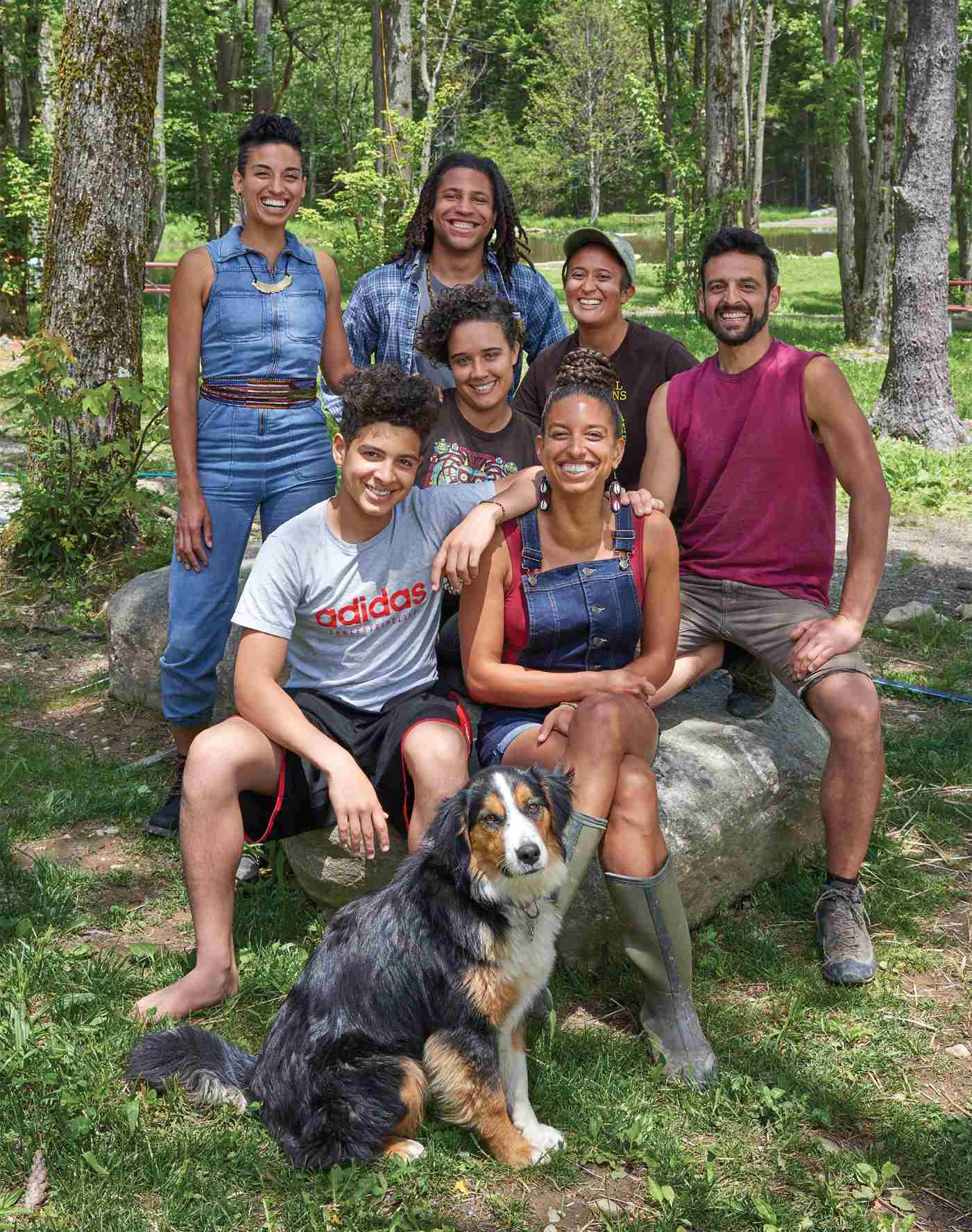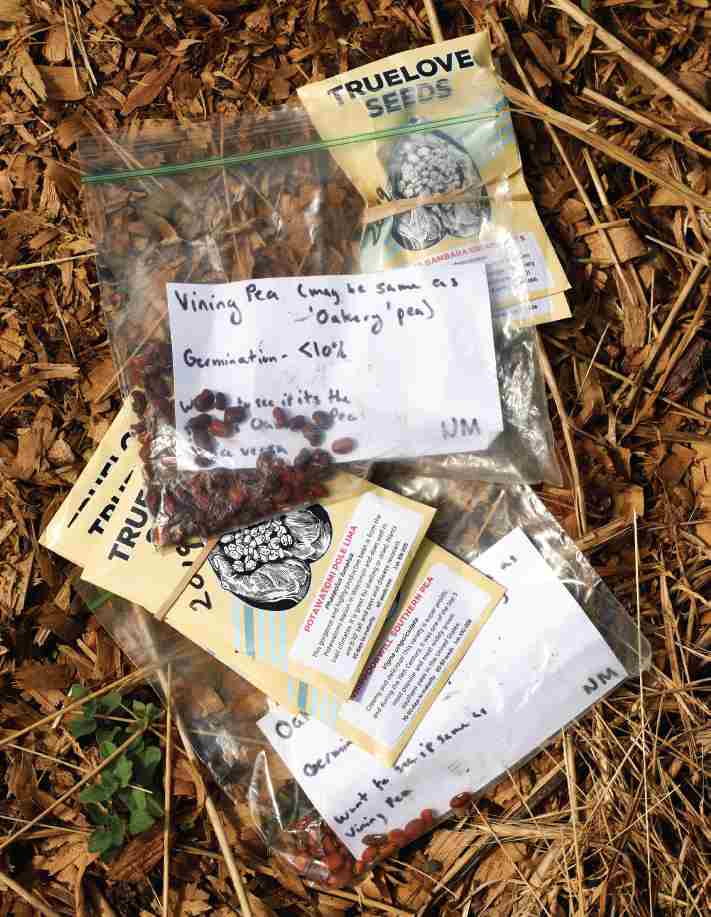8.
Black to the Land
Our ancestral grandmothers in the Dahomey region of West Africa braided seeds of okra, molokhia, and Levant cotton into their hair before being forced to board transatlantic slave ships. They hid sesame, black-eyed pea, rice, and melon seed in their locks. They stashed away Amara kale, gourd, sorrel, basil, tamarind, and kola in their tresses. The seed was their most precious legacy, and they believed against odds in a future of tilling and reaping the earth. They believed that we, Black descendants, would exist and that we would receive and honor the gift of the seed.
With the seed, our grandmothers also braided their ecosystemic and cultural knowledge. African people, expert agriculturalists, created soil-testing systems that used taste to determine pH and touch to determine texture. Cleopatra developed the first vermicomposting systems, warning citizens that they would face harsh punishment for harming any worm. Ghanaian women created “African dark earth,” a compost mixture of bone char, kitchen scraps, and ash that built up over generations, capturing carbon and fertilizing crops. African farmers developed dozens of complex agroforestry systems, integrating trees with herbs, annuals, and livestock. They built terraces to prevent erosion and invented the most versatile and widely used farming tool: the hoe. Our people invented the world’s initial irrigation systems five thousand years ago and watered the Sahel with foggaras that are still in use today. They domesticated the first livestock and established rotational grazing that created fertile ground for grain crops. Our ancestors created sophisticated communal labor systems, cooperative credit organizations, and land-honoring ceremonies. Our ancestral grandmothers braided all this wisdom and more into their hair and brought it across the Middle Passage. It is our heritage.

Photo credit: Alison Gootee
SOUL FIRE FARM IS A BLACK-, INDIGENOUS-, AND PEOPLE-OF-COLOR-LED COMMUNITY FARM IN PETERSBURG, NEW YORK, FOUNDED BY LEAH PENNIMAN AND HER HUSBAND, JONAH VITALE-WOLFF.
Despite the colonial projects of chattel slavery, sharecropping, convict leasing, redlining, lynching, and systemic discrimination, our people held tight to the seeds and cultural wisdom they inherited. They are our rememberers, and we celebrate them. We give thanks to Dr. George Washington Carver for reminding us to regenerate the soil with leguminous cover crops and thick mulches. We offer gratitude to Fannie Lou Hamer for carrying on the cooperative tradition with the establishment of Freedom Farms. We acknowledge Booker T. Whatley for bringing us the farm-to-table marketing strategies of “pick your own” and community-supported agriculture. We pay homage to Shirley and Charles Sherrod for their role in creating the first-ever community land trust on fifty-seven hundred acres of Black-owned land in Georgia. And to Hattie Carthan for urban farms, and to Ira Wallace for seed keeping, and to all the rememberers we have not named, we offer our thanks.
My grandmother Brownie McCullough Smith was one of these rememberers. The Great Migration carried her from rural North Carolina to the dense neighborhoods of greater Boston, yet she maintained her relationship to soil. Grandmommy kept a strawberry patch and a crabapple tree, and I remember harvesting and making preserves at her side as a small child. Amid a stormy sea of racialized bullying and familial trauma, I clung tight to this relationship with plants and land as an anchor throughout my early years.
As soon as I was old enough to be paid for my labor, I took a job with the Food Project in Boston, learning to tend vegetable crops and run farmers’ markets in formerly redlined neighborhoods. I was hooked. Sustainable farming lived at the intersection of my passionate love for the earth and my commitment to social justice. I could tend the soil and feed my people. I went on to work at several other farms in the northeast, including Many Hands Organic Farm and the Farm School, and eventually I started a youth urban farming program in Worcester called YouthGROW. I attended every organic farming conference that I could and read dozens of books on sustainable agriculture, convinced that life on the land was my destiny.
Doubt threatened to become disillusionment by the time I had circled the sun twenty-one revolutions. At the time I did not know about Carver, Whatley, Hamer, or any of the other Black agrarian rememberers. All of the conference presenters, book authors, and farm owners I encountered were white. I had been fed images of only white people as the stewards of the land, only white people as organic farmers, only white people in conversations about sustainability; the only consistent story I’d seen or been told about Black people and the land was about slavery and sharecropping, about coercion and brutality and misery and sorrow. I had been bombarded with messages that our only place of belonging on land is as slaves, performing dangerous and backbreaking menial labor. I wondered if my perception of my own destiny was misguided and if my skills and talents would be of greater use in the movements for education justice, prison abolition, or any of the myriad struggles that seemed more relevant to Black people. I wondered if I was a traitor to my ancestors in choosing to be a farmer, if I was undoing generations of effort to get our people off of the land and into urban spaces.
And yet, hidden from me, there was an entire history, blooming into our present, in which Black peoples’ expertise and love of the land and each other was evident. I needed to uncover the truth that our twelve-thousand-year history of noble, autonomous, and dignified relationship to land as Black people far surpassed the 246 years of enslavement and the seventy-five years of sharecropping in the United States. As Black farmer Chris Bolden-Newsome explains, “The land was the scene of the crime.” I would add, “She was never the criminal.”
Just to cover my karmic bases, I became a high school teacher, working predominantly in urban public schools over a seventeen-year period and rabble-rousing for relevant curricula, racial equity, and the dismantling of the school-to-prison pipeline. Still, destiny has a tight grasp, and I never managed to skip a single growing season on the land, which meant a life of second and third shifts to get it all in.
After years of working on other people’s farms, my partner, Jonah, and I realized it was time to start our own project. The seminal moment came when we were living in the South End of Albany in 2005 with our two young children and could not, despite our college degrees and “farmy” skills, access fresh food for our family. Our apartment was in a neighborhood under food apartheid, that system of institutional racism that populates certain zip codes with fast food and liquor stores, and other zip codes with upscale farmers’ markets and high-end groceries. When our neighbors learned that we knew how to grow food, they demanded, “When are you going to start the farm for the people?”
We took that challenge seriously and started exploring the lands around Albany, New York, to see which parcel would claim us as friends and stewards. In 2006, we signed “white man’s papers” to wed eighty acres of eroded and degraded mountainside land that would become Soul Fire Farm. We spent years investing in the soil and basic infrastructure, building a straw bale home by hand, and installing a driveway, electricity, septic, and water well. The farm grew over the years from our family’s project to a community farm with a staff of eight people and an extended family of thousands of volunteers, alumni, and members. It shifted from a parcel that was privately owned by our family to a cooperative model where all residents have a voice in decision making and the land herself has veto power through divination.

Photo credit: Alison Gootee
In the Krobo language of Ghana, there is a proverb that guides our work, “Three stones make the cooking pot stand firm.” The three “stones” of our work are the farm, the training programs, and the reparations organizing.
Our first and most important “stone” is the farm. We intensively cultivate five acres of vegetables, fruits, herbs, eggs, and pastured poultry using Afro-indigenous regenerative practices that leave the land with more organic carbon and biodiversity each year. We also care for seventy-plus acres of wildlands, which are sustainably harvested for fuel and medicines, while maintaining habitat for our nonhuman relatives. All that nutrient-dense food gets boxed up weekly and delivered to the doorsteps of the hundred-plus families who are members of our Ujaama farm share and pay whatever they can afford on a sliding scale. Many of these members are our neighbors who asked us to start Soul Fire Farm back in 2005.
Our second “stone” is the training programs. Many Black folks do not have the luxury to attend remote agricultural schools or work for free at a so-called apprenticeship. So, we attempt to “skill up” our community through the BIPOC FIRE (Black-Indigenous-People of Color Farming in Relationship with Earth) fifty-hour residential course, which weaves together farming, carpentry, organizing, and trauma healing in a culturally relevant and supportive space. We also embody “each one teach one” through our youth workshops, advanced farming 2.0 sessions, books, videos, articles, lectures, and other free dissemination of knowledge on Black agrarianism.
Our third “stone” attempts to address the structures that prevent Black farmers from thriving. It is no accident that 98 percent of the rural land is owned by white people, that Black farmers comprise only 1.5 percent of the farmers, and that our people are more likely to suffer from diet-related illnesses and hunger. Reparations are due for a history of enslavement, dispossession, and discrimination. We catalyze reparations through our Uprooting Racism training program, a regional land trust for BIPOC land stewards, and a reparations map that matches those with inherited wealth to Black farmers who need resources. We are also working in solidarity with Turtle Island indigenous communities whose land was violently wrenched from them and who deserve immediate and unequivocal sovereignty in their unceded territories.
Soul Fire Farm is a precious and powerful place, but it is far too rare. We need hundreds of BIPOC-led agricultural training and healing spaces if we are to survive as an agrarian people. The seed is passed to you, Black child of Black gold. If we do not figure out how to continue the legacy of our agricultural traditions, this art of living in a sacred manner on land will go extinct for our people. Then the KKK, the White Citizens’ Councils, and Monsanto will be rubbing their hands together in glee, saying, “We convinced them to hate the earth, and now it’s all ours.” We will not let the colonizers rob us of our right to belong to the earth and to have agency in the food system. We are Black Gold—our melanin-rich skin the mirror of the sacred soil in all her hues. We belong here, bare feet planted firmly on the land, hands calloused with the work of sustaining and nourishing our community.